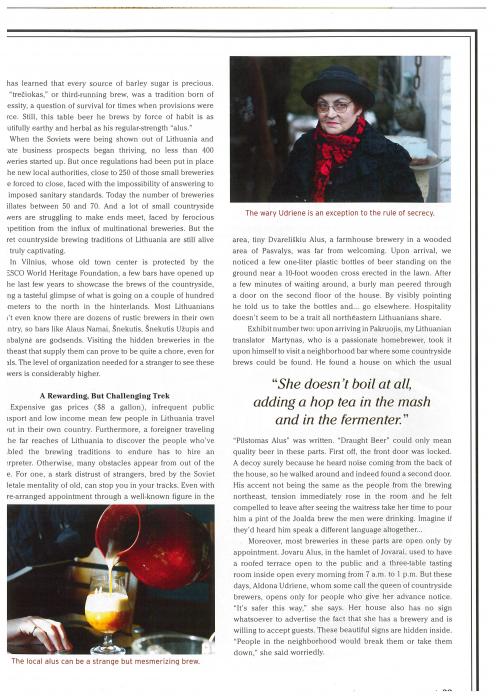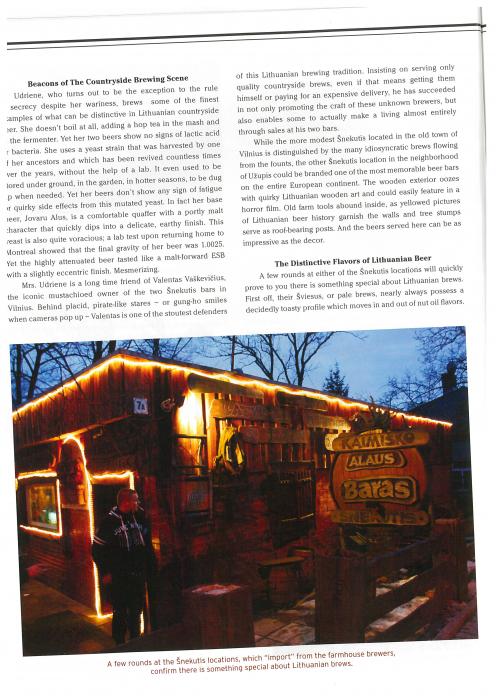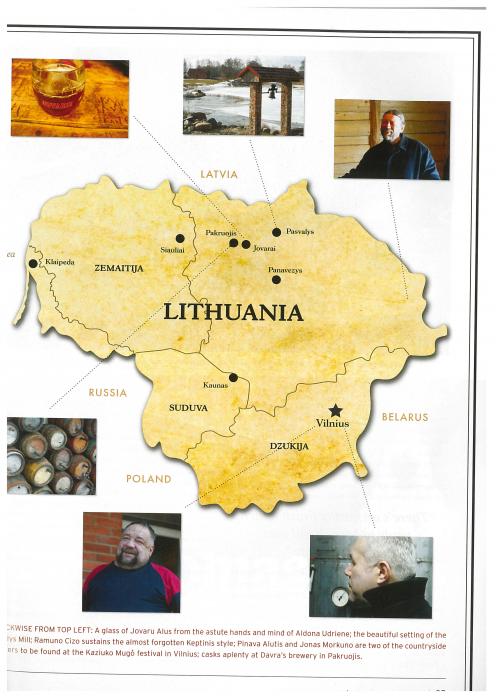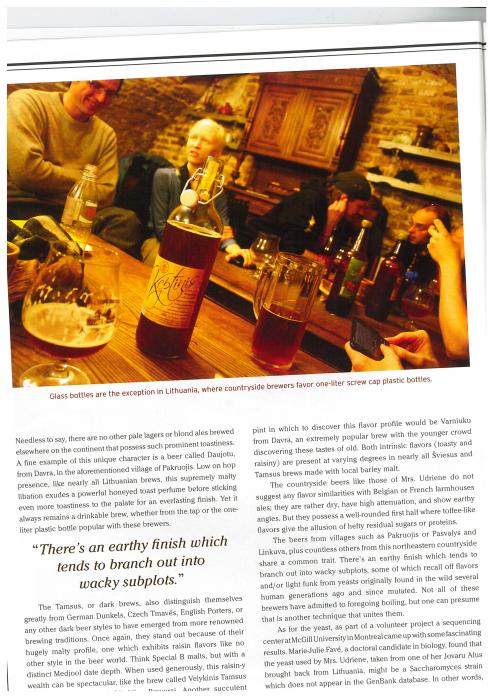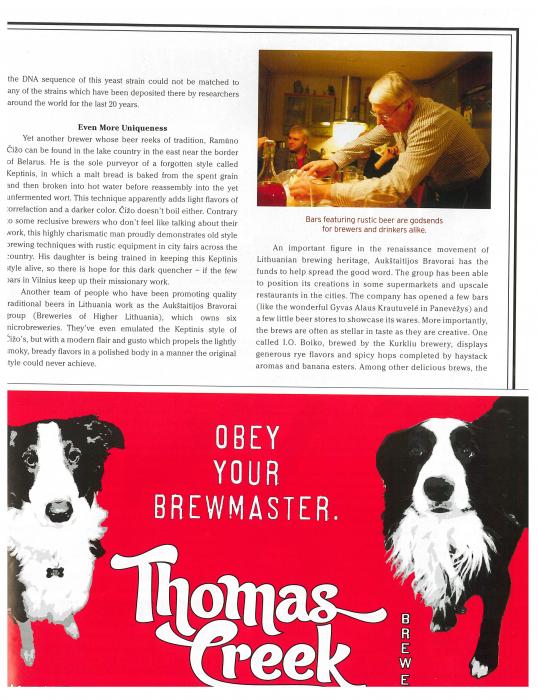This thread got me searching a bit. A good source is LithuanianBeer.com. There are some good blog links there, and information on Lithuania's commercial breweries. It seems that the bigger brewers make German style lagers, but the farmhouse brewing is alive and well, even using a unique strain of yeast.
You are using an out of date browser. It may not display this or other websites correctly.
You should upgrade or use an alternative browser.
You should upgrade or use an alternative browser.
Beer Connoisseur article on traditional Lithuanian brewing. No-boil + hop tea?
- Thread starter Radegast
- Start date

Help Support Homebrew Talk:
This site may earn a commission from merchant affiliate
links, including eBay, Amazon, and others.
sumbrewindude
Well-Known Member
- Joined
- Nov 16, 2013
- Messages
- 879
- Reaction score
- 150
Can't wait. Thanks dude!
![Craft A Brew - Safale S-04 Dry Yeast - Fermentis - English Ale Dry Yeast - For English and American Ales and Hard Apple Ciders - Ingredients for Home Brewing - Beer Making Supplies - [1 Pack]](https://m.media-amazon.com/images/I/41fVGNh6JfL._SL500_.jpg)
$6.95 ($17.38 / Ounce)
$7.47 ($18.68 / Ounce)
Craft A Brew - Safale S-04 Dry Yeast - Fermentis - English Ale Dry Yeast - For English and American Ales and Hard Apple Ciders - Ingredients for Home Brewing - Beer Making Supplies - [1 Pack]
BellaRae

$58.16
HUIZHUGS Brewing Equipment Keg Ball Lock Faucet 30cm Reinforced Silicone Hose Secondary Fermentation Homebrew Kegging Brewing Equipment
xiangshuizhenzhanglingfengshop

$53.24
1pc Hose Barb/MFL 1.5" Tri Clamp to Ball Lock Post Liquid Gas Homebrew Kegging Fermentation Parts Brewer Hardware SUS304(Gas Hose Barb)
Guangshui Weilu You Trading Co., Ltd

$53.24
1pc Hose Barb/MFL 1.5" Tri Clamp to Ball Lock Post Liquid Gas Homebrew Kegging Fermentation Parts Brewer Hardware SUS304(Gas MFL)
yunchengshiyanhuqucuichendianzishangwuyouxiangongsi

$22.00 ($623.23 / Ounce)
AMZLMPKNTW Ball Lock Sample Faucet 30cm Reinforced Silicone Hose Secondary Fermentation Homebrew Kegging joyful
无为中南商贸有限公司

$7.79 ($7.79 / Count)
Craft A Brew - LalBrew Voss™ - Kveik Ale Yeast - For Craft Lagers - Ingredients for Home Brewing - Beer Making Supplies - (1 Pack)
Craft a Brew

$176.97
1pc Commercial Keg Manifold 2" Tri Clamp,Ball Lock Tapping Head,Pressure Gauge/Adjustable PRV for Kegging,Fermentation Control
hanhanbaihuoxiaoshoudian

$10.99 ($31.16 / Ounce)
Hornindal Kveik Yeast for Homebrewing - Mead, Cider, Wine, Beer - 10g Packet - Saccharomyces Cerevisiae - Sold by Shadowhive.com
Shadowhive

$45.74 ($45.74 / Count)
Brewer's Best Home Brew Beer Ingredient Kit - 5 Gallon (Grapefruit IPA)
Amazon.com

$82.50
Wilbur Curtis Brew Cone Assembly with Splash Pocket, High Volume - Commercial-Grade Brew Basket - WC-3422 (Each)
Global Commercial Parts

$33.99 ($17.00 / Count)
$41.99 ($21.00 / Count)
2 Pack 1 Gallon Large Fermentation Jars with 3 Airlocks and 2 SCREW Lids(100% Airtight Heavy Duty Lid w Silicone) - Wide Mouth Glass Jars w Scale Mark - Pickle Jars for Sauerkraut, Sourdough Starter
Qianfenie Direct
sumbrewindude
Well-Known Member
- Joined
- Nov 16, 2013
- Messages
- 879
- Reaction score
- 150
Sweet. Thanks Hammis!
In doing some more homework, trying to get a handle on this and figuring out a system so that "beer" will be made, I had to do some looking into Kvass. I know it's not really the same, but it's the only thing I can think of that uses bread as part of the mash, so I wanted to see that implementation so that I could formulate a better idea for this one.
So far, I think it'll end up like this -
- Get a third more grain than necessary, and separate that from the base recipe
- Toss this 1/3 into a blender/processor and process finely, combine with sugar/water/whatever to make the loaves and bake.
- Once finished baking/cooling, tear up and soak overnight in 190F water
- Use immersion blender to blend "bread" into water, heat to 151F and combine with mash water volume
- Add in mash grains, mash 90min
- Continue on with before mentioned concept.
AFA hops go, I know that they're using German hops for their tea. I've seen a couple articles where they say there's a hop presence, but no actual IBU's. I'm thinking of trying for 20-25IBU and end up "balanced", as the hop requirement to hit 30-40IBU is insane (like double Pliney insane - which for me is insane).
I could go with Bravo for the hop tea, but there's this evil side of me that wants to use Summit and a saison yeast and just let this whole thing go wild....
In doing some more homework, trying to get a handle on this and figuring out a system so that "beer" will be made, I had to do some looking into Kvass. I know it's not really the same, but it's the only thing I can think of that uses bread as part of the mash, so I wanted to see that implementation so that I could formulate a better idea for this one.
So far, I think it'll end up like this -
- Get a third more grain than necessary, and separate that from the base recipe
- Toss this 1/3 into a blender/processor and process finely, combine with sugar/water/whatever to make the loaves and bake.
- Once finished baking/cooling, tear up and soak overnight in 190F water
- Use immersion blender to blend "bread" into water, heat to 151F and combine with mash water volume
- Add in mash grains, mash 90min
- Continue on with before mentioned concept.
AFA hops go, I know that they're using German hops for their tea. I've seen a couple articles where they say there's a hop presence, but no actual IBU's. I'm thinking of trying for 20-25IBU and end up "balanced", as the hop requirement to hit 30-40IBU is insane (like double Pliney insane - which for me is insane).
I could go with Bravo for the hop tea, but there's this evil side of me that wants to use Summit and a saison yeast and just let this whole thing go wild....
Cool, thanks!
So i bottled up the batch with the British yeast today. OG was 1.084 FG was 1.032, so only about 60% attenuation. I tasted the hydrometer sample i took and right away got a punch of raisiny flavour followed by a lot of residual sweetness. I'm not sure if this is from the extract I used (never used extract before), the grain bread i added into the mash or the fact that the beer didnt seem to have finished fermenting. I ended up with 3x500ml and 2x12oz bottles from this batch. I'm letting the flemish ale batch sit for a year so no real news on that one. we'll see how the beer tastes once carbonated.
sumbrewindude
Well-Known Member
- Joined
- Nov 16, 2013
- Messages
- 879
- Reaction score
- 150
Got some greenery for the MLT coming on Tues. Hope to have some leaf hops by then also if the LHBS has any left in stock.
Still undecided on yeast, but I've got a pack of S33 at the ready. I'd prefer to use something with a bit more teeth like Notty...
Still undecided on yeast, but I've got a pack of S33 at the ready. I'd prefer to use something with a bit more teeth like Notty...
sumbrewindude
Well-Known Member
- Joined
- Nov 16, 2013
- Messages
- 879
- Reaction score
- 150
Alfa's in - got it from the middle of the slice so it's still green. Smells awesome, fresh. Should go great in the tun, ordering grains this next week sometime. Think I'm going to go with T-58 for the yeast, that way I can ferment it high (80ish). Still on the fence about the hops.
Maybe Magnum. Or Columbus. What to do, what to do...
Also still massaging the brew schedule - thinking i should make the loaves the day before, then treat them like a kvass, and "mash" them overnight in a slow cooker and add that into the tun with the leftover grains.
Maybe Magnum. Or Columbus. What to do, what to do...
Also still massaging the brew schedule - thinking i should make the loaves the day before, then treat them like a kvass, and "mash" them overnight in a slow cooker and add that into the tun with the leftover grains.
Sounds cool sumbrewindude. Keep us posted on how it turns out.
I tasted a bottle of my British yeast last night and wow was I pleasantly surprised. The flavour profile has greatly improved with just one week of bottle conditioning. Residual sweetness has toned down and the dried fruit flavours have become more pronounced, yet not overwhelming. A nice winter warmer for sure. Now I wish I had done this earlier in the winter and brewed more of it, lol
I tasted a bottle of my British yeast last night and wow was I pleasantly surprised. The flavour profile has greatly improved with just one week of bottle conditioning. Residual sweetness has toned down and the dried fruit flavours have become more pronounced, yet not overwhelming. A nice winter warmer for sure. Now I wish I had done this earlier in the winter and brewed more of it, lol
sumbrewindude
Well-Known Member
- Joined
- Nov 16, 2013
- Messages
- 879
- Reaction score
- 150
Dang it Hammis, now you're making me want to try out the S33. I always keep a few packets in the fridge for those uh-oh moments. I've been trying to make a few recipies that would use the remainder of the T58, so a couple wit's and a belgian just in case. Still need to get the grains on order, it's been a crazy week and it's only Monday.
I need to figure out pictures on here, I have a feeling this is going to be one of those Kodak Brews, if ya dig.
I need to figure out pictures on here, I have a feeling this is going to be one of those Kodak Brews, if ya dig.
hallebrewer
Member
- Joined
- Jan 3, 2013
- Messages
- 21
- Reaction score
- 2
Has anyone cultured up the yeast from Jovaru Alus?
hallebrewer
Member
- Joined
- Jan 3, 2013
- Messages
- 21
- Reaction score
- 2
That's awesome, if you manage to get some Lithuanian farmhouse ales and the yeast survives, maybe we can do a trade. I'm in Ontario and have a few interesting strains.
sumbrewindude
Well-Known Member
- Joined
- Nov 16, 2013
- Messages
- 879
- Reaction score
- 150
Alright, doing this today.
Had hoped to start this up yesterday and bake the bread/overnight soak in a crockpot, but work called me in and I lost a full day, so this will be truncated a bit.
Grains for 1.5gal S23 Keptinis: Reserving 3# of grain for mash, 14oz for bread.
2lb 2row
10oz Munich 10L
10oz Rye malt
10oz Carastan
From that I mixed all the crushed grains, and removed 14oz of mixed grains and put them into a food processor and ground it to near flour, and mixed in 1oz of sugar. Placed into a mixing bowl and added water slowly until it started to turn to glue, then added a large dollup (1tblspn) of clover honey, and continued mixing. Added regular flour to transfer to a flat sheet with parchment paper and flattened the "bread" down to fill a 13x9 tray. Into the oven at 350F for 45min, watching for browning. Tasted very sweet going into the oven, hoping for some caramelzation at the end of the bake.
Plan is to take that bread, crumble it, and put it with the mash. Mashing 120min at 2qt/gal will give me 1.75gal of first runnings and be enough to clear my 15min boil. Have alfalfa for the MLT, and will be using 0.5oz Pacifica hops in the mash (old, need to get used). Once the mash is done, it's a 15min boil with a 0.5oz Warrior addition at 10min. Then crash cool into fermenter, pitching Safale S04 (Whitbread), and into a water bath with fishtank heater to 78F for 5days then to ambient (65F).
Hoping this goes well! If I can figure out how to get pic's of the wife's Iphone I'll try to get them up here.

EDIT - Baked to 1hr, top and sides are done, bottom's a little sticky yet. Put another piece of parchment paper on it and flipped it, removing the bottom parchement carefully - it's back in the oven for another 15min upside down to finish. Tastes great so far!
Edit 2 - Baked 90min; 60 one side, flipped, 30 the other side. Crust is done, insides at temp, still sugary sticky in the middle. Think the honey had something to do with that - got some "help" to crumble it into the tun.
Edit 3 - 60min into mash, mashed in at 153F @ 2qt/lb. Temp is holding strong at 151.8. Strong odor of "tea" from the alfalfa/hops mix, color looks like tea also. Stirred well, buttoned it up for another 30min.
Edit 4 - Even at 2qt/lb I missed my boil volume. Had to quick sparge to make the 1.85gal I needed for 15min. Shame, had 16.5P on my first runnings. Going into the kettle with 13.8P and a hard boil. Hot break is crazy...
Edit 5 - Final numbers at just over 1.5gal into the fermenter, 15.3P - getting the water bath ready. Not sure if I should start with 78F immediately, or let S04 start then move. S04 takes off and finishes fast, may just put it in immediately and hope for the best.
Now to figure out how to put pics in here.
Had hoped to start this up yesterday and bake the bread/overnight soak in a crockpot, but work called me in and I lost a full day, so this will be truncated a bit.
Grains for 1.5gal S23 Keptinis: Reserving 3# of grain for mash, 14oz for bread.
2lb 2row
10oz Munich 10L
10oz Rye malt
10oz Carastan
From that I mixed all the crushed grains, and removed 14oz of mixed grains and put them into a food processor and ground it to near flour, and mixed in 1oz of sugar. Placed into a mixing bowl and added water slowly until it started to turn to glue, then added a large dollup (1tblspn) of clover honey, and continued mixing. Added regular flour to transfer to a flat sheet with parchment paper and flattened the "bread" down to fill a 13x9 tray. Into the oven at 350F for 45min, watching for browning. Tasted very sweet going into the oven, hoping for some caramelzation at the end of the bake.
Plan is to take that bread, crumble it, and put it with the mash. Mashing 120min at 2qt/gal will give me 1.75gal of first runnings and be enough to clear my 15min boil. Have alfalfa for the MLT, and will be using 0.5oz Pacifica hops in the mash (old, need to get used). Once the mash is done, it's a 15min boil with a 0.5oz Warrior addition at 10min. Then crash cool into fermenter, pitching Safale S04 (Whitbread), and into a water bath with fishtank heater to 78F for 5days then to ambient (65F).
Hoping this goes well! If I can figure out how to get pic's of the wife's Iphone I'll try to get them up here.

EDIT - Baked to 1hr, top and sides are done, bottom's a little sticky yet. Put another piece of parchment paper on it and flipped it, removing the bottom parchement carefully - it's back in the oven for another 15min upside down to finish. Tastes great so far!
Edit 2 - Baked 90min; 60 one side, flipped, 30 the other side. Crust is done, insides at temp, still sugary sticky in the middle. Think the honey had something to do with that - got some "help" to crumble it into the tun.
Edit 3 - 60min into mash, mashed in at 153F @ 2qt/lb. Temp is holding strong at 151.8. Strong odor of "tea" from the alfalfa/hops mix, color looks like tea also. Stirred well, buttoned it up for another 30min.
Edit 4 - Even at 2qt/lb I missed my boil volume. Had to quick sparge to make the 1.85gal I needed for 15min. Shame, had 16.5P on my first runnings. Going into the kettle with 13.8P and a hard boil. Hot break is crazy...
Edit 5 - Final numbers at just over 1.5gal into the fermenter, 15.3P - getting the water bath ready. Not sure if I should start with 78F immediately, or let S04 start then move. S04 takes off and finishes fast, may just put it in immediately and hope for the best.
Now to figure out how to put pics in here.
sammy33
Well-Known Member
SBD - Sounds good. Don't eat all the bread before you brew! 
sumbrewindude
Well-Known Member
- Joined
- Nov 16, 2013
- Messages
- 879
- Reaction score
- 150
Fermentation took off after 4hrs, fish tank heater's only keeping the waterbath at 76F it seems, lower than I'd hoped. SWMBO took off with her Iphone shortly after the madness started, so I was forced to use the old Sony camera (which I'm having a terrible time finding the transfer cable because someone *ahem* didn't put it with the camera case...).
Have pics, as soon as I can get them out of the demon photo box I'll upload 'em.
Definitely and interesting experience in brewing!
Have pics, as soon as I can get them out of the demon photo box I'll upload 'em.
Definitely and interesting experience in brewing!
The_Professor
Well-Known Member
...One of the styles involves making spent grain bread then crumbling it back up into the wort, pre-fermentation...
I am finding these two statements interesting....The bread is made not from spent grain, but from mash dough....
While I guess grains that have been mashed could be called "spent grain", I guess that grain in a thick mash with no sparge would indeed be different from "spent grain" after a sparge.
So is that what the second comment means? And if so...what about the water from the mash?
sumbrewindude
Well-Known Member
- Joined
- Nov 16, 2013
- Messages
- 879
- Reaction score
- 150
In that case I suppose it could be like a pseudo Berlinerwiess, but there's a couple things I'd like to mention with the mash/spent mash (at least the way that I did it, right or wrong).
The addition of the hay/straw/whatever really made quite a mess in the mash - even with it bagged separately, it soaked up wort and floated up vs staying at the bottom of the tun (like I've seen with spruce branches, etc). So trying to separate the grains from that addition would prove to be a real pain. Also, when I made the bread (and added to the mash, not the wort) I ground up the grain reasonably fine and used water/honey as a binder with no yeast to raise it. Just a regular flat bread with crust, which was fine on it's own but the moment it hit the hot water it disintegrated back down into grains. I'd imagine you'd have a spectacular mess in your fermenter with the amount of bread that I added, roughly a quarter of the total grain bill.
After reading up a few times with the articles and the websites posted, it really is a shot in the dark AFAIC, unless you really have access to the process all we're doing is adapting established techniques to fit hearsay.
Whiffed the airlock on my Keptinis last night - smells of fruity "tea". Bubbling away like a mad-man in there, almost makes me wish I'd have tried an open ferment with it. Maybe next time...
The addition of the hay/straw/whatever really made quite a mess in the mash - even with it bagged separately, it soaked up wort and floated up vs staying at the bottom of the tun (like I've seen with spruce branches, etc). So trying to separate the grains from that addition would prove to be a real pain. Also, when I made the bread (and added to the mash, not the wort) I ground up the grain reasonably fine and used water/honey as a binder with no yeast to raise it. Just a regular flat bread with crust, which was fine on it's own but the moment it hit the hot water it disintegrated back down into grains. I'd imagine you'd have a spectacular mess in your fermenter with the amount of bread that I added, roughly a quarter of the total grain bill.
After reading up a few times with the articles and the websites posted, it really is a shot in the dark AFAIC, unless you really have access to the process all we're doing is adapting established techniques to fit hearsay.
Whiffed the airlock on my Keptinis last night - smells of fruity "tea". Bubbling away like a mad-man in there, almost makes me wish I'd have tried an open ferment with it. Maybe next time...
sumbrewindude sounds cool, let us know how it turned out. I have a DVD about craft beer in lithuania, it's pretty interesting and shows how they use the hay as the filter bed at the bottom of the mashtun, so they fully anticipate that some of the grain will get mixed in with it. Unfortunately the video is only in lithuanian, otherwise I would try to rip and post it.
I was also able to reference a book from the 1930's and from what i found, the grain "bread" (term used VERY loosely), was literally just milled grain pulled from the mash tun after 1 hr of mashing, the liquid was drained off (and added back to the mash) and the remaining removed grain was loosely formed into "loaves" (again, that term is very loosely used) and baked for an hour
sumbrewindude
Well-Known Member
- Joined
- Nov 16, 2013
- Messages
- 879
- Reaction score
- 150
Hammis - Can do, as soon as I can figure out how to get pics off the camera I'll up load them also.
So, technically the bread should have been added to the wort and not the mash? I based my process off of Kvass, and a BYO recipe's process as I couldn't find a lot of info on the bread inclusion.
Huh. Well that might change some things around, I guess it really would be close to a Berlinerwiess - the major difference being though that they have a top-secret, super-aggressive yeast to pitch immediately that probably helps with the no-boil thing.
Dang it, I guess I'll have to re-tool and try this AGAIN. :rockin:
BTW, I know I posted a quick and dirty recipe in my above post, but if anyone wants the whole shenanigan I'll post it up.
So, technically the bread should have been added to the wort and not the mash? I based my process off of Kvass, and a BYO recipe's process as I couldn't find a lot of info on the bread inclusion.
Huh. Well that might change some things around, I guess it really would be close to a Berlinerwiess - the major difference being though that they have a top-secret, super-aggressive yeast to pitch immediately that probably helps with the no-boil thing.
Dang it, I guess I'll have to re-tool and try this AGAIN. :rockin:
BTW, I know I posted a quick and dirty recipe in my above post, but if anyone wants the whole shenanigan I'll post it up.
From what i understood of the text i read, the bread goes back into the mash. For this particular style from what I can gather, they typically didn't boil the wort, hence the use of a hop tea (which would have been added right into the fermenting vessel). Like you sumbrewindude, i changed the recipe a bit to experiment. Either way I this this has been a very worth while thread and experiment and I will definitely be brewing more of this beer in the future 

Similar threads
- Replies
- 135
- Views
- 9K
- Replies
- 23
- Views
- 3K
- Replies
- 27
- Views
- 6K
- Replies
- 4
- Views
- 3K


